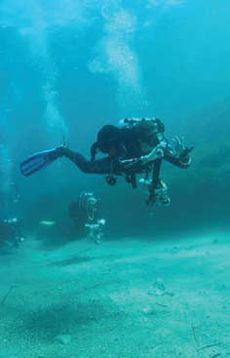




| Home | Features | Club Nights | Underwater Pics | Feedback | Non-Celebrity Diver | Events | 8 August 2025 |
| Blog | Archive | Medical FAQs | Competitions | Travel Offers | The Crew | Contact Us | MDC | LDC |

|

|
 
 |
 |
ISSUE 6 ARCHIVE - DIVING DENTISTCelehte FortuinMouthpieces. A bit of rubber at the end of your regulator that sits in your mouth. Hardly riveting stuff or so I thought! Asking a group of divers what mouthpiece they use and how they rate it, is like dropping a bomb and running for cover. OK, so I may be exaggerating a bit, but every diver swore they had found the Holy Grail of mouthpieces. And very few of them were the same and no one was changing!Q: I am experiencing discomfort and some pain in my jaw biting down on my regulator whilst diving. After the dive I have a feeling of tightness in my jaw and, as I had the all clear at my last dental visit, I can only put this down to my regulator. What could be causing this? A: Jaw and muscle pain during diving can be as a result of continued biting on the mouthpiece. That bit of rubber is, after all, the final bit of kit from that precious tank on our backs delivering life preserving air so we can continue to look at all the pretty things underwater. And we will bite down on that baby as hard as we can to ensure it does not go anywhere, right? This continued strain on the muscle from biting down can lead to jaw ache, facial pain and to what some have termed as a mouthpiece headache". |
 |
|
The chewing muscles responsible for
opening, closing and moving the lower
jaw from side to side, are the same
muscles responsible for holding the
regulator mouthpiece between our
teeth. These muscles, along with the
jaw joint (TMJ) are a finely tuned, wellbalanced
mechanismů most of the
time. When muscles relax, the lower jaw
is slack and in a position of rest, with the
joint in a neutral position and the teeth
slightly apart. Any prolonged activity
that brings the teeth closer together
over an extended period of time, will
increase muscle workload and tension,
eventually tipping the balance and
leading to muscular pain.
In dentistry, a common cause of facial pain, joint discomfort and unexplained headaches is grinding or clenching the teeth at night during sleep. Interestingly, not all grinders will be symptomatic and seek advice! |
||
|
This is the reason that not all divers
experience your symptoms and
discomfort, even though we are effectively
clenching our jaws together during dives.
In the dental world, we have different
types of custom made bite guards,
night guards, bite splints or clenching
inhibitors to assist, encourage or coax
the muscles, joint and teeth into a
neutral jaw relationship during hours
of sleep to decrease muscle tone and
alleviate symptoms.
The diving industry is catching on fast and there is a good selection of mouthpieces available to suit divers' needs. From off the shelf", ready-to-wear to custom made mouthpieces. A whole range of them can be shortened, softened or moulded for a more comfortable fit. Much as you want a dry suit to fit perfectly, these allow you to find something that is so comfortable that the mouthpiece is the last thing on your mind during dives. Some mouthpieces feature gel cell cushions, where the teeth engaging legs are filled with liquid silicone in rubbery cells. The gel cushions have no memory and reshape easily after dives allowing for a fresh" cushion dive after dive. Others have raised rubber cushions on the legs. These have the benefit of slightly opening the distance between the teeth and lessening the strain on the muscles. Yet another favourite amongst divers were the Comfy Bite (different spellings depending on the brand name) mouthpieces, which have a thin rubber band on the roof of the mouth creating a little suction and keeping the piece in position without the need to exert much muscle force. The group of custom made mouthpieces held more interest. These had thermoformable linings, which you dip in hot water and clasp between the teeth. You are effectively creating a mould of the teeth, keeping the teeth and jaws in a stable position. The perceived benefits being that there is less rubbing on the gums due to stability of the mouthpiece, the joints are protected as they are in a comfortable bite position for you and allowing the facial muscles to relax. All very huge plus points. Mouthpieces are generally inexpensive and worth the investment trying to find one that is totally comfy for you. I grind my teeth and wear a night guard that gives my muscles enough of a break" not to influence my diving too much. However, having had experience of swapping between one to four regulators on technical dives and sometimes even a surprise fifth on safety drills, I have noticed and can appreciate the benefit of a comfortable mouthpiece. You may well need to see your dentist if you feel a few issues raised here are of concern to you. A bite analysis or other investigations may be needed to determine atypical facial pain not related to diving or grinding.) Do you have burning dentistry issues? Celehte has all the answers. Chew your way through to the Contact page and send your query to the Diving Dentist. |
 |
|
Previous article « Can I Dive With - ADHD? Next article » Paul Toomer: Agony Aunt Back to Issue 6 Index | ||